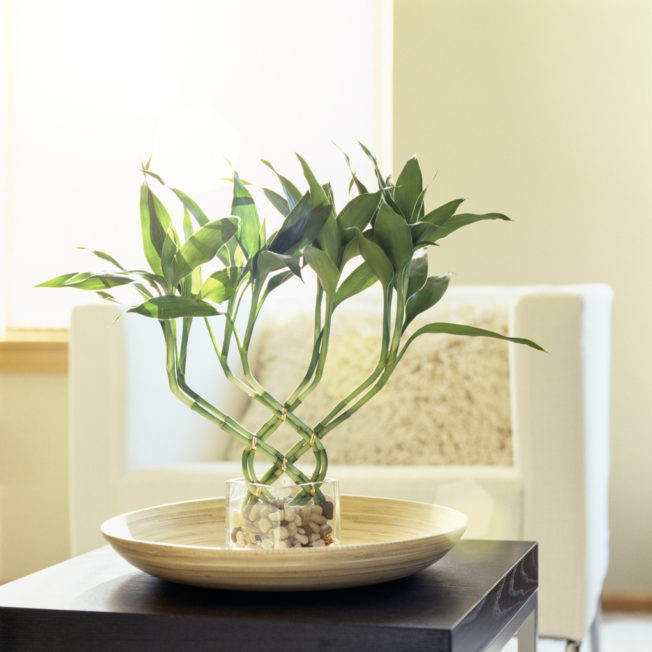Maybe you’ve tragically lost a passed plant companion to a devastating yet utterly inexplicable case of severe dehydration. Or maybe you’re a stage eleven commitment-phobe pathologically incapable of caring for so much as a cactus. Yet, regardless of whether the employees at your local nursery store secretly refer to you as ‘the constant gardener’ or ‘the green reaper,’ if you could use a little boost in your overall health and happiness (and let’s be real, who couldn’t?), you might want to consider inviting a little foliage into your life or, at the very least, your home or office.
There’s no denying a little greenery can work wonders in the home decor department. Simply adding a houseplant or two can visually transform practically any space, taking it from dull and drab to fresh and fab in an instant. Yet, houseplants certainly have more to offer than mere visual aesthetics alone.
Improve Indoor Air Quality
The American Lung Association warns that indoor air often contains far more pollutants than the air we encounter outside. All-too-common indoor air pollutants include asbestos, mold, radon, formaldehyde, benzene, and carbon monoxide, to name a few. Exposure to these indoor air pollutants over time has shown to cause symptoms ranging from dry, irritated eyes to headaches, from asthma to mesothelioma.
The most effective means of detoxifying the air inside any interior space is through the use of a quality air purifier. However, houseplants act as natural air purifiers by absorbing air pollutants through their roots and leaves and are, therefore, an accessible and affordable alternative (or better yet, addition) to a traditional air purifier.
Studies also show that homes that have houseplants are less likely to have dust and mold than homes without houseplants. One particular study concluded that homes with houseplants contained 60% less airborne mold and bacteria than homes without houseplants.
Humidify The Home
Plants don’t just reduce, eliminate, and prevent pollutants, bacteria, dust, and mold from the air inside our humble abodes- they also release moisture from their leaves into the air, in a process known as transpiration. This equally impressive plant process restores moisture into dry air during those frigid winter months, simultaneously saving both your skin and immune system in one fell swoop.
Reduce Anxiety
A study published in The Journal of Physiological Anthropology found that actively engaging with plants (as in seeing, touching, and caring for them) significantly reduces both physiological and psychological stress. According to the study, interacting with indoor plants results in the ‘promotion of comfortable, soothed, and natural feelings.’
Decrease Depression
Even exposure to the soil used in potted plants can reduce stress and anxiety levels. Potting soil contains microbes, which release cytokines. This release of cytokines serves triggers the brain to begin producing serotonin, which, in turn, ultimately boosts your mood, eases your anxiety, and improves your overall sense of wellbeing.
Increase Creativity
A study by Texas A&M University found that exposure to potted plants and flowers can increase creativity, job performance, and even sharpen your ability to problem-solve.
Improve Concentration
According to a study conducted by Exeter University, UK, indoor plants improve concentration, boost productivity, and contribute to an overall sense of well-being in the workplace by a whopping 47%. While a study by the University of Michigan research project concluded that even merely being in the presence of plants can increase one’s memory retention by up to 20%.
Sewing Seeds of Wellness
While all living plants reduce air pollutants and increase air moisture, when it comes to positively affecting your health and happiness, not all houseplants are created equal. According to NASA, Peace Lily and English Ivy are most effective at filtering air pollutants and toxic fumes. Several studies suggest that the scent of Jasmine reduces anxiety and improves the quality of one’s sleep.
The snake plant, AKA ‘mother-in-law’s tongue’ (yikes), emits oxygen at night which is known for improving the quality of one’s sleep. It also removes harmful chemicals like xylene, trichloroethylene, toluene, benzene and formaldehyde from indoor air.
Last but not least, it just doesn’t get any simpler, or easier, than placing a small potted lavender plant on your nightstand or near your bed. Studies show the scent of lavender can reduce elevated heart rate, blood pressure, and stress. Oftentimes, it’s simpler than it seems to sew seeds of wellness into the fabric of your life, but by starting out small, keeping it simple, and inviting a houseplant or two into your home and workplace, beautiful things will begin to grow, as will you!





















